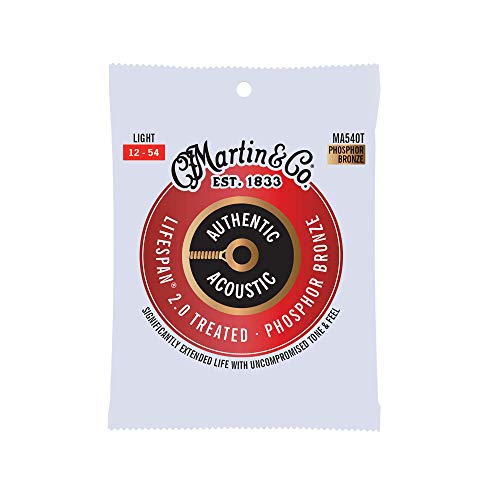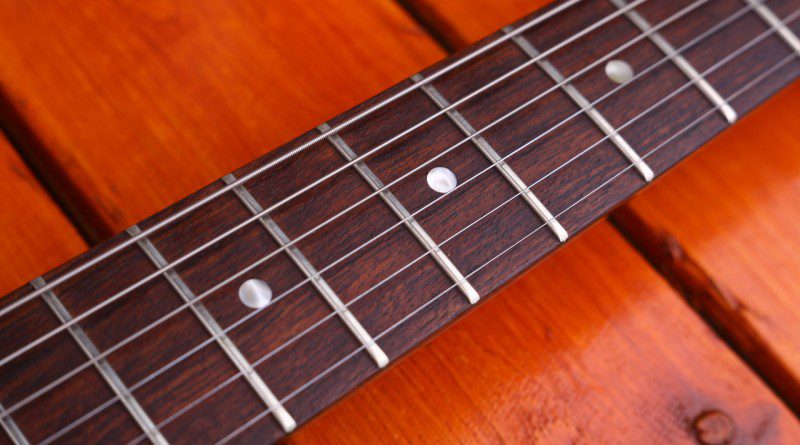Guitar strings play a pivotal role in your tone. A new set of good-quality guitar strings have a zing to them that breathes life into every strumming pattern and make the high-end chime like a bell. This brightness and richness, however, diminishes over time.
Believe it or not, your fingers are the primary suspect for the ‘grime scene’ that accumulates on the strings and fretboard. This grime (or gunk) is a mixture of dead skin, dirt, and oils transferred from your fingertips that get caught in the grooves of the strings from continuous use.
Over time, you are left with strings that appear blackened and dirty as the build-up increases. Worse yet, the dirt alters how your guitar strings vibrate. It eventually leads to a dull and lifeless guitar tone. This can drastically change your playing and listening experience.
In this post, we’ll provide you with a guide to all the methods and means to clean your strings. Before that, let’s start with some basic ways to get the most of what you have.
Contents
How to Maintain and Improve Guitar String Lifespan?
Before: Wash your hands with soap and water.
After: Wipe the strings with a lint-free microfiber cloth.
Get into the habit of washing your hands using soap before you start playing your guitar. It will remove most of the oil and dirt, which would otherwise stick or get transferred to your fretboard and strings. In turn, you’ll add a few days to the lifespan of your strings.
The oils can be cleaned periodically, but they will degrade the string quality in the meantime. To avoid this, it’s best to wipe your strings with a cloth after every session of practice – right before you place your guitar back in the cover or on its stand. It is just a few minutes of work that will pay rich dividends.
Cloth-cleaning: The Old School Method
You’ve probably considered cleaning the guitar and strings with some soapy, warm water and/or a cotton cloth. Worse yet, you might have been using this for months or years to clean your guitar periodically.
Firstly, soap and water is a big NO! They will cause or speed up corrosion on most guitar strings. You can get away with a dry cotton cloth but cotton sheds. It sheds lint – little bits of thread or fluff – that only adds to the problem, especially on the fretboard.
There are a few other problems. Firstly, many cheap cleaning rags that we use at home are of unknown origin. They could be a blend of cotton and other synthetic material. Certain materials can cause scratches on the fretboard or finish of your guitar.
Now, if I were dealing with a throwaway China-made guitar, this might be pardonable. Nevertheless, any mid-market or premium guitar deserves a specialist cleaning product. Such products ensure you don’t damage the finish, moisture-balance, or natural oils of your guitar.
Can I use rubbing alcohol to clean my guitar strings?
Rubbing alcohol or isopropyl alcohol can be used to clean strings. It will get them squeaky clean by eliminating gunk. The downside is that you’ll hear the effect of this in the fret buzz. The sound lingers for a while. It’s far from pleasant. The real reason to stay away from it is the damage alcohol can do to your neck by drying out the wood.
Rubbing alcohol is a strong/harsh cleaning agent that will dehydrate wood if it comes into contact with the fingerboard. If you rub it on your strings, some of it is bound to reach the wood as you press down the strings.
There are ways to avoid these pitfalls as using lemon oil to condition the fretboard, but that amounts to more work. It defeats the whole purpose, especially when there are several cheap alternatives specially designed for the task.
5 Best Guitar String Cleaning Products:
Best Clamp-Style Cleaner: Scobuty String and Fretboard Cleaner (2 Pack)

If you are using a cotton cloth, cleaning underneath the strings is always a challenge. It only gets worse if you have set your action to low or medium-low. A clamp-style cleaner can be a useful tool to sidestep this issue.
This gadget is essentially a life-free felt cloth in a plastic clamp-like device that be clipped onto the guitar strings to clean them. This design makes it super easy to clean every part of the string with minimal effort. The handle is easy to grip and you can dismantle the cleaner and remove the fabric to wash/clean it.
The ‘up-and-under’ design and the handle makes it easy to operate. Additionally, it also cleans some of the fretboard gunk as you clean the strings and prevents long-term grime buildup. You can also replace the fabric when it wears out without buying a new one. Plus, it is roughly the size of a credit card.
Best String Cleaner and Lubricant: D’Addario XLR8

The MN109 is a blend of natural and mineral oils in an easy-to-grip container with an applicator attached to the top. The product also includes a lint-free microfiber cloth. The width of the applicator is sufficient to cover the 6-strings on any guitar type (more on different guitar types in our full guide).
The applicator (pad) and microfiber are as good as they get. You can tuck the cloth in a built-in compartment in the bottle. Using it is quite simple – open the bottle, rub it on the strings, and wipe off the excess with the cloth provided.
This product does a decent job at cleaning the strings, but it’s primarily intended to be a string lubricant. The lubrication is essential for reducing friction to eliminate ‘fret buzz’. It is commonly used by metal guitarists, shredders, or other musicians who enjoy fast-n-frenzied playing.
We prefer this one to its competitors because Music Nomad sells a refill pack, which will save you money in the long run. The overall quality of the product is a notch above similar products at this price point. And, it smells better than the rest too.
Best Guitar String Rust Remover: Baroque Double-Headed Eraser

The plastic device is designed as a double-sided sharpie. On one end, you have a felt-tip with lubricating oil that acts as a string cleaner/lubricator. On the other end, there is a ‘rust removing’ eraser with a gray felt tip to deal with corrosion.
First, rub the gray end up and down your strings to remove the dirt and corrosion. Once your strings are clean, lubricate them with the other end to reduce friction and form a layer that will protect them. It doesn’t get more simple or convenient than this.
The eraser works well for acoustic and electric guitars but not so much on bass strings. In any case, if your bass strings are rusted, they ought to be changed. Overall, this is a light, compact, and effective device that warrants a permanent place in any guitar maintenance kit.
Best String Cleaning Tool Set: Nomad Tool Set + Slim

I love the Nomad Slim because it contains two double-sided tools with varying widths that cover all my needs. The brush and pad are excellent for a fast but thorough cleaning session.
I own many electric, semi-hollow, and acoustic guitars. They have individualized needs based on the brand, pickups, and bridge. The gap between the pickups and bridge is a particularly troublesome spot that needs all kinds of finger gymnastics to clean.
The slim brush can get that done with ease. It also cleans the dust between the tuning machines and other areas on the headstock. Moreover, it can slide under the tailpiece, the short style pickguard on my ES-335, and the floating bridge on my ESP.
In a nutshell, I’m yet to find a nook on my guitar(s) that either of the two tools can’t reach into. Plus, it doesn’t need any additional liquid cleaning solution. I’ve had one in my gig bag for a long time, and it always gets used right before a gig.
Long-Lasting Guitar String Recommendations:
Martin SP Lifespan 2.0: (Best for Acoustic Guitar)

Martin’s Lifespan (Phosphor Bronze) come standard on mid range Martin guitars, and are designed to look and sound bright over weeks. Nevertheless, they are ‘settled-in’, and you don’t need a few hours of play to even out the overtly bright sounds that new strings are associated with.
The overall tone is rich with a detailed mid-range response. In my experience, they last several weeks longer than many of the competitors that I’ve tried. The tension is great (neither tight nor slack). Sound-wise, they offer good detail with ample high-end sparkle.
Ernie Ball Paradigm: (Best for Electric Guitar)

Paradigm strings boast of the familiar sounds of the Slinky in a plasma-enhanced wrap wire for increased tensile strength, tuning stability, and long-lasting performance. Each string is highly corrosion resistant and draped in a proprietary Everlast coat designed to retain the natural response and vibration.
I recommend the EB Paradigm strings as they have survived some heavy whammy playing on my Floyd Rose Guitars without ever getting a chance to claim a refund based on their 90-day no breakage/rust promise.
Elixir Nanoweb: (Best All Round)

Elixir strings are an excellent choice if you seek an extended lifespan without compromising on frequency response. Between Nanoweb, Polyweb, and Optiweb product lines, these coated strings are available in various gauges for electric and acoustic guitars.
It may take a moment to get used to the way they feel if you’ve been using regular strings for very long. However, Elixir’s entire catalog has received a lot of critical and commercial acclaim. They are highly recommended.
Final Thoughts
Sound starts with the strings and good sound needs strings that aren’t weighed down by gunk. Keeping your guitar clean and in good condition not only helps it to sound better, but can also help to maintain its value, too. I hope this article has highlighted how to prolong the life of your guitar strings and provided you with a ‘tone’ of options to get the job done. The right tools make it simple to get into the habit of maintain your instrument, which will save you a lot of money in the long run.
You can also learn more about guitar strings from our full guide.
By the way, if you liked this post you should check out some of our guide to choosing the best guitar cleaning kit, as well as our other string related content, like our guide on how to restring an acoustic guitar, our guide to recycling guitar strings, and the story behind the guitar center string club!

